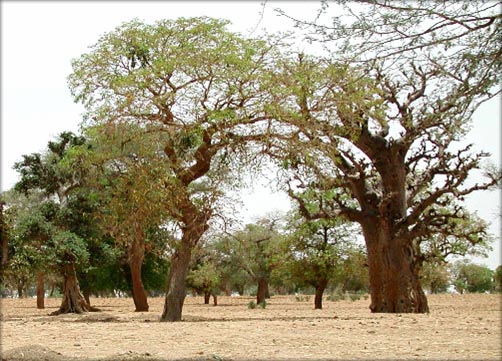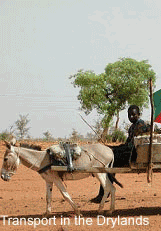West Africa Drylands Project
Ecosystems Approach to Restoring West Africa Drylands
The project emphasizes application of science-based tools to help accelerate reliable learning on sustainable dryland management and increase adaptive capacity at all scales, from local communities to regional and international policy bodies
West Africa Drylands
Welcome to the project "An Ecosystem Approach to Restoring West African Drylands and Improving Rural Livelihoods through Agroforestry-based Land Management Interventions".
This is a United Nations
Environment Programme (UNEP) project conducted in partnership
with the World
Agroforestry Centre, the Centre for Environmental
Policy of the

Drylands - where poverty & environment interact
Managing the world's dryland environments is perhaps one of the most challenging and pressing development problems of today. Dryland ecosystems are vulnerable to degradation from human impacts and climate change, and yet support the livelihoods of one billion rural poor people. Long-term strategies for eradicating poverty in the world's drylands will only succeed when the natural resources on which the poor depend are used sustainably; and programmes for protecting the dryland environment will accomplish their aims only when they also address the day-to-day pressures of poverty. Nowhere is this poverty-environment linkage more evident than in the Sahelian drylands of West Africa, which contains three out of the four poorest countries in the world.
Testing an ecosystems approach for sustainable development
The conservation and sustainable use of the drylands can be best achieved by managing land, water and living resources together, in an integrated manner-an ecosystems approach. Through this pilot project UNEP is testing an ecosystems approach to sustainable management drawing on latest technology and science-based tools for assessing dryland ecosystem health and evaluating and testing sustainable land management and policy interventions.
The project is introducing
science-based innovations in three key areas:
· New remote
sensing and ground survey techniques to assess land degradation at
different scales, from local land use level to regional level.
· Integrated
environmental accounting methods that value ecosystem resources and
services in a way that their true value can be incorporated into policy
evaluation and development processes at national to local scales.
· Community-based
agroforestry techniques that generate high-nutrition foods, medicinal
and other high-value products in just a few years, while conserving the
land resource base.
Project Objectives
The overall goal of the project is to restore degraded West African ecosystems and improve rural livelihoods. The project targets the West African Parklands, which are integrated tree-crop-livestock systems. The Parklands span across the whole of the Sahel and their ecosystem services support over 40 million people. However, the Parklands are believed to be rapidly degrading in many areas, undermining the natural resource base on which the population's livelihoods ultimately depend. There is urgent need to quantify the degree, extent and causes of ecosystem degradation and to systematically target policy and management interventions to address them while improving human well-being.
The specific objectives are to build
regional, national and local capacities at local to regional scales in:
· Targeting of land
management interventions and monitoring their impacts
· Evaluation of
policies for sustainable land management
· Conservation
agroforestry practices and adaptive ecosystem management
The main expected results of the
project are:
· Improved
scientific and technical capacity among national and regional policy
institutions for evaluation, targeting and testing of policies for
sustainable management of dryland ecosystems at local to regional
scales.
· Increased
capacity among pilot village communities in adaptive land use
management and agroforestry-based land conservation practices.



